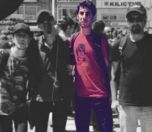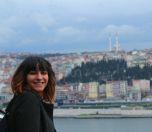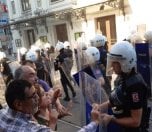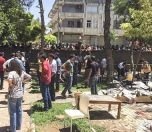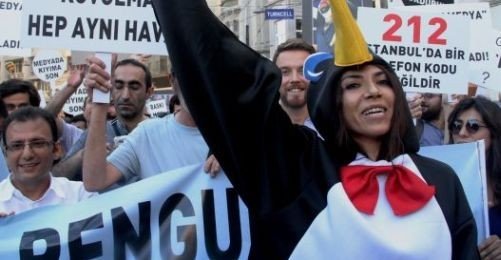The small town of Suruc on the Turkish-Syrian border was rocked on Monday by a suicide bomb attack that took the lives of at least 32 people and injured almost 100 others. The attack, believed to have been perpetrated by IS, targeted a group of young, left-wing activists who had come together from across Turkey to help with the reconstruction of Kobane, the small town that earlier this year played host to an intense battle for control between Kurdish forces and IS militants across the border in Syria.
The attack prompted a harsh reaction against the Turkish state from the Kurdish political movement and diaspora community. Protests were held on Monday in front of Turkish embassies in London, Paris, Brussels and The Hague, and chants of “terrorist Turkey” and other slogans directed against the government of President Recep Tayyip Erdogan were uttered in anger at the attacks. Meanwhile, in Turkey itself, the charismatic co-leader of the pro-Kurdish Peoples' Democratic Party (HDP), Selahattin Demirtas, released a statement that accused Ankara of complicity in the Suruc massacre, “All countries and regimes from which IS and similar armies of rape receive support are partners in this barbarism. Those who stay quiet in the face of IS, who cannot dare to even raise their voices [against it], the leaders in Ankara who threaten the HDP every day while patting IS on the head; they are partners in this barbarism.”
The Kurdish reaction to this tragic attack has amplified an oft-repeated criticism of the state by many in the Kurdish movement: namely that Turkey is culpable for the rise of IS, that the state has directly and indirectly supported the terrorist group, and that Ankara has used IS as a proxy in a war against Kurdish forces in Rojava (Kurdish Syria). The massacre in Suruc is perceived by many of those who ascribe to this narrative as the latest episode in this alleged proxy campaign against the Kurds.
Senior government figures have frequently denied these claims, while both President Erdogan and Prime Minister Davutoglu strongly condemned Monday’s attack. A senior official from the prime minister’s office described the bombing as “retaliation for Turkey’s recent anti-terror operations against IS” while Davutoglu has said that Turkey has “never tolerated any terrorist group.” The message coming out of Ankara is that this was an attack against Turkey, rather than only the elements within the country that sympathise with the struggle of the Kurds in Kobane.
This messaging is not unexpected given the scale of such an attack on Turkish soil and is clearly designed to reverse the growing perception in Turkey and abroad that the state has, to some extent, been tacitly supportive of IS. However, it is unlikely that such statements will do much to assuage the concerns of Turkey’s Kurds, who have heard President Erdogan’s Justice and Development Party (AKP) repeatedly make it clear that it sees the Kurds who defended Kobane and the Kurdish political movements in Turkey and Syria as equal threats to IS. In just the last 12 months, President Erdogan has equated IS to the outlawed Kurdistan Workers’ Party (PKK), the PKK to the Kurdish movement in Syria, described Turkey’s pro-Kurdish HDP as representing terror, and questioned the international attention directed towards Kobane during the city’s resistance against occupation by IS.
Meanwhile, IS’ near-open recruitment of Turkish fighters in Turkey’s major cities was reported in the international press by Alev Scott and Ceylan Yeginsu long before Turkey’s security services deigned to crack down on the phenomenon, with the latter journalist being subjected to a very public campaign of intimidation and threats by the pro-government media for her reporting on the matter after President Erdogan described her investigative piece as “shameless, immoral treason.” Allegations that Turkish authorities have turned a blind eye to IS oil smuggling and armed jihadi groups in Syria with trucks laden with arms have only served to intensify suspicions regarding Ankara’s Syrian policies. That IS’ rise to prominence in Syria occurred at a time when Ankara implemented an ill-conceived porous border policy, during which jihadis freely passed between the countries and enjoyed access to hospitals and sanctuary in Turkey, cannot be overlooked either.
In light of all of this, it is difficult to argue that Ankara is entirely free from culpability for the circumstances that led to the Suruc massacre, although it is important to emphasise that this should not be taken as an accusation of direct state complicity in the attack. The government of Turkey has done much to foster a climate of enmity towards the Kurdish movement in Turkey and Syria through its at times vitriolic rhetoric; has repeatedly displayed an attitude of seeming indifference or tolerance towards IS until recent crackdowns; and has facilitated the emergence of a patchwork of armed jihadi groups south of the border through its determination to support the routing out of Assad. Question marks remain over the security services’ role in failing to prevent the massacre in one of the most heavily guarded and monitored areas in Turkey. That a country that shares a border with an armed group of IS’ calibre still had plenty of room for improvement with regard to its border security prior to the attack is a sad indictment of the lax attitude that Turkey has displayed towards the threat posed by IS.
The fear now for Turkey is that the jihadi forces that it has enabled to flourish appear to be coming home to roost. The example of Pakistan, which allegedly first supported and has since been plagued by similar extreme groups, will be a chilling one for Turks and Kurds who have only very recently embarked upon the welcome road to peace and reconciliation after decades of conflict in the southeast of the country. If Turkey does indeed fall into the throes of domestic Islamic extremist violence, the blame will surely lie with President Erdogan’s AKP government, which has facilitated the growth of such groups through its failed attempts to topple the Assad regime at all costs. One can now only hope that Monday’s tragedy spurs Turkey’s intransigent political parties to form a new government that will take steps to reverse the mistakes of the last few years. (AY/BD)
*Alev Yaman is a writer and human rights activist based in London and Istanbul. She has worked as a researcher and consultant for a number of organizations specializing in freedom of expression, including English PEN, PEN International and Article 19.






